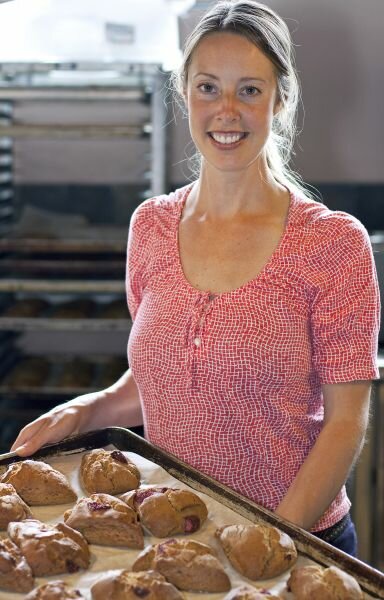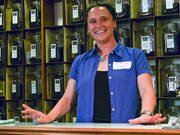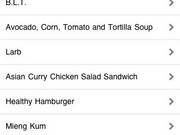It's been a hectic week, so let's talk about tea this afternoon. "Tea," I have been informed, "is restful in a lot of ways that coffee is not."
Earlier this week I was invited down to the Perennial Tea Room in Post Alley, for a little presentation about what to expect at the 2010 Northwest Tea Festival, on October 2 and 3 at Seattle Center (free, but a $5 suggested donation nets you a commemorative ceramic tasting cup that's yours to treasure).
Personally, I would expect hobbits. Dyed-in-the-wool tea drinkers always impress me in that way. But as a subculture (here in the Northwest, coffee is the dominant culture), their gathering for a festival apparently attracts other tea-friendly subcultures.
One year, laughed Perennial Tea Room's Julie Rosanoff, it was a Lolita-themed group. This year, they're expecting some cosplayers of the Otaku variety. And some herbal teas, some of which technically are more an "infusion." But time marches on. Last year brought 1,500 tea pilgrims; for 2010 they hope to see 2,000.
Previous festivals have been strictly tea-centric, but with the Essential Baking Co. as a festival sponsor, look for a variety of tea cakes: blueberry-orange, lemon-raspberry, and carrot-pineapple, all made with organic ingredients. I tried two slices of each, and in conclusion feel that the best option is two slices of each. You'll also find sandwiches, soups, and tarts....
You can trust a beekeeper, can't you? Biologist Bernard Chevilliat moved to France's Ardeche region in 1977, and started an apiary which grew to 500 hives. In 1983, he founded Melvita, stocking his shelves with processed bee products: your soaps, your honeys (which they still sell).
By 1991, Melvita had grown into a full-fledged organic cosmetics company (similar to Burt's Bees development on these shores). "Melvita's total product range consists of 250 articles manufactured from more than 580 natural ingredients," reports Organic-Market.Info.
This year, Melvita has come to America, opening its first store in San Francisco and its second in downtown Seattle, at Pacific Place. (A grand opening ribbon-cutting and wine-and-cheese reception is tonight, June 16, from 5-8 p.m. One shopper will win a gift basket, presented at 7:30 p.m.)
Their current worldwide expansion has come from the strength of their merger with Provence's L'Occitane back in 2008. Chevilliat remained managing director of his firm, which is still staunchly eco-friendly. It's what's best for the bees.
 Jennifer Katzinger (Photo: Rachelle Longé)
Jennifer Katzinger (Photo: Rachelle Longé)
"I had been exposed to gluten-free at a juice bar in Greenlake years ago, and I was baking there and I really had fun working with all their different flours, and so I was just familiar with other grains," Jennifer Katzinger said. "And so I just got thinking, there are so many baked goods you can get in the Northwest, but finding a baked good that is with whole grains, or dairy and egg-free was hard. Organic too. Hence the Flying Apron."
Katzinger and I were sitting in the corner of the Walnut Street Coffeehouse in Edmonds, her nine-month-old daughter Lily, wearing a white knit sweater, playing on the seat between us. Charming and enthusiastic, Katzinger was telling me about the genesis of her vegan, gluten-free bakery, which she opened with her father in the University District in 2002. Eight years and two moves later, the Flying Apron is still going strong, and in addition to recently becoming a mother, Katzinger is now an author: in November, Sasquatch Books published her first cookbook, Flying Apron's Gluten-Free and Vegan Baking Book ($21.95).
A Northwest native, Katzinger grew up baking. In her early teens, she was already working at Lake Street Bakery ("That was a warm and cozy and delicious atmosphere, and I felt so safe there"), but after getting her BA in English Lit at the UW, she pursued a degree in industrial design at the Pratt Institute in NYC before returning to Seattle. When her and her father, both in need of new career directions, decided over coffee one morning to open the Flying Apron together, the concept wasn't as expressly gluten-free as it eventually became. While Katzinger was an on-and-off again vegan, originally the bakery featured a couple items that used egg and dairy--the idea was to have something for everyone, and the gluten- and wheat-free products were as much a creative touch as a conscious choice.
What led Katzinger to purge her work of gluten and wheat was the ecstatic response of customers. Wheat and gluten intolerance are actually common allergies, and on top of that, there's Celiac disease, in which wheat gluten wreaks havoc on the small intestine. The responses of her customers, some of whom would burst into tears when they found themselves in a bakery they could actually eat at, deeply affected her.
"The symptoms are so broad and different," Katzinger told me of the various stories her customers have shared. "One woman, a really beautiful woman who'd come to the bakery often, she traveled for work a lot, and she had been gluten-free for a long time, and had to go to Italy on business. And she thought, 'What the heck? I'm going to have the lasagna.' And for her, it was actually something like a schizophrenic type of situation. She had an episode, and just realized she can't go down that road."
"And other people, it just took them so long to be diagnosed Celiac. I remember this young woman coming in, I think she was going to the UW, and for years she was going to the hospital with digestive issues. And they would say, 'Oh, you need to eat more bran.' And so she would eat more bran and keep going in, and they would say, 'Oh, I think maybe you have something mentally going on, because we don't see anything wrong with you, and yet you keep complaining about your digestive issues.' So they put her on anti-depressants, and she went to Bastyr after that, where they did an allergy test and a Celiac test, and said, 'You have Celiac, there's no reason for you to be on anti-depressants.' So there's some really unusual stories out there, but in the U.S. they're pretty common. I think it takes, on average, 11 years to be diagnosed with Celiac's disease."
In order to create the rich variety of tasty baked goods that have garnered her attention, Katzinger experiments with and uses a wide-variety of alternative flours and sweeteners. Her list of staple ingredients includes at least nine flours: brown rice, garbanzo bean, buckwheat, teff, quinoa, corn, fava bean, chestnut, and hazelnut. Her goods are also organic and avoid most highly-processed ingredients; she doesn't use standard sugar, and many recipes call for non-sugar sweeteners like agave syrup, maple syrup, or concentrated fruit juice.
Katzinger also tries to locally source as much as possible. Asked where she came by hazelnut flour, she exclaimed: "Holmquist Farms! They sell hazelnuts and hazelnut oil and hazelnut flour at the farmers' markets! And I think they're in some of the grocery stores, now."
The recipes in the book range from sweet morning pastries to cookies to cakes to breads. Asked whether any of the recipes were particularly meaningful to her, she told me, "The pecan pie recipe is very special, because my husband was very involved with that one. That was early on, when we met each other, that we did that recipe together. I met him through the bakery, actually. He was a customer, and he would come to the take-out window in the University District frequently, and we just became friends. I was going to delivery my very first wedding cake, and I was really nervous about it, just kind of sharing this with him not so much to invoke an invitation to help, but in any case, that's indeed what happened. He said, 'Can I give you a hand with that?' And I took him up on it, and we had a great time."
For eight years, the Flying Apron was Katzinger's life, and in some ways the cookbook represents the apex of that career. "I dedicated the cookbook to Lily," she said, looking down at her daughter, who'd long since let all her toys slip to the floor and was now playing with a saucer, sitting in her mom's lap.
"I wrote it while I was pregnant with her, and finished it right before she was born. And since her arrival, it's just completely changed me. Before she arrived, the bakery was what I gave my all to, my absolute all to. Since she's been in the world, it's been a wonderful experience, but it's been hard to give my all to the bakery and to give to my daughter, which is what I want to do. I didn't see that coming. I mean, I knew I'd love being a mom, but I had no idea how powerful that is."
She smiled at her daughter, who'd given up on the saucer and was now pawing her mom's face. "So I've actually just sold the bakery, believe it or not. The first day of my not being the owner was January first."
Katzinger is remaining on as a recipe consultant, developing new recipes when not dedicating herself to parenting. For her, it's apparent that the joy of baking is no longer the only reason to continue her work--today, Katzinger seems as inspired by the need for food like hers as the joy she gets from creating it.
"In my young adulthood, there were times when--I wasn't allergic to food, but I made choices: to be a raw foodist at one point, a strict vegan at others," she told me. "And actually, I was unhealthy for a while, someone with real food issues. So while I don't know what it's like to have Celiac, I know what it's like--and this by my own choice, so there are differences but similarities, too--I know what it's like to be an outcast with eating. And how painful that can be. So for people who have allergies, or Celiac, I'm excited to share with them these recipes that I think so many people will enjoy, so they can have a table that's abundant, full of sharing of food and stories, and that's inclusive."
"Day 253/365 - Beware of Falling Fruit" from our SunBreak Flickr pool--thanks, Great Beyond!
The Seattle Times found on the PCC website the local flashpoint in the conflict over genetically engineered food: A letter came in from Dennis L. Weaver: "I caution the organic community to be watchful of this NEW Green Revolution, especially since The Gates Foundation science and technology efforts are led by a former Monsanto researcher."
PCC included an editor's note:
The Gates Foundation apparently is pushing genetically modified crops on African farmers. It named a 25-year Monsanto veteran, Rob Horsch, to be the senior officer for a program in sub-Saharan Africa. The foundation also reportedly gave $42 million to a project (believed to be Monsanto’s) involving genetically engineered (GE) corn...
Monsanto is of course a fighting word in organic and food cooperative circles, not least for its championing of recombinant bovine growth hormone (rBGH). Actually, it's a long list of things if you get into it, including Agent Orange.
Farmers themselves are also suspicious of a company that develops seed "terminator technology"--which would require farmers to buy new seeds each year. (Monsanto responds: "Sharing many of the concerns of small landholder farmers, Monsanto made a commitment in 1999 not to commercialize sterile seed technology in food crops.")
Briefly, this is why the Gates Foundation's hiring of a Monsanto executive would raise hackles. Monsanto has a "trust gap."
Genetically engineered food would seem to show such promise, on the face of it. Texas A&M's Normal Borlaug, winner of the 1970 Nobel Peace Prize, had an opinion piece in the Wall Street Journal over the summer, promoting advancements and bemoaning the fact that "some elements of popular culture romanticize older, inefficient production methods and shun fertilizers and pesticides, arguing that the U.S. should revert to producing only local organic food."
Not all the opposition reeks of stinky hippiedom. Even Michael Specter, who thinks such risks as there are are worth taking, describes in his book Denialism how in 1995 Pioneer Hi-Bred "placed genes from a Brazil nut into a soybean...to make beans used as animal feed more nutritious." So far so good, but Specter adds that if someone allergic to Brazil nuts ate something made from that soy, "the results could be deadly."...
Michael Specter's book Denialism (de rigueur subtitle-of-absurd-length: How irrational thinking hinders scientific progress, harms the planet, and threatens our lives) might look like it'd fit nicely on the bookshelf with Why People Believe Weird Things and Unscientific America, but it would likely jump the other two and scuff up their dust jackets. Specter has been writing for the New Yorker since 1998, and some of the Big Apple's pugnacity seems to have rubbed off on him. Or maybe he was always that way.
It's a curious book because while you might expect Holocaust (or other genocide) deniers, 9/11 conspiracy theorists, creationists, global warming skeptics, or other troublesome bands of misinformers to pop up, they don't. "I decided to focus on issues like food, vaccinations, and our politically correct approach to medicine," writes Specter in the introduction, "because in each of these arenas irrational thought and frank denialism have taken firm root."
Yet as Grist argues in a critique of the book, if a small group of global warming deniers delays action long enough that we reach a point of no return for the planet, that's a big deal. If a small group of people insist on paying more for Whole Foods organic produce because it makes them feel healthier, that's...part of their shopping budget. Yet, Grist notes, "The book’s index has no entry for 'climate change.' The entry for 'Global warming' cites just one page—a reference to genetically modified foods as a “solution” to global warming."
I can't speak for Specter, but his approach feels Freakonomics-y or Gladwellian: one of those "forget everything you thought you knew" come-ons, juiced up with the blood of a few hodgepodge sacred cows. In his introduction, Specter's language is fairly circumspect and even-keeled. But the chapters on the "irrational" response to Vioxx, hysteria around vaccines, the rise of the organic food fetish and natural supplement worship, and the role of genetics in medical treatment, contain what some call "provocative" and others might call "unsubstantiated" claims.
Even when I agreed with him, Specter managed to rub me the wrong way. Though he struggles to sound filled with empathy for the irrationalists, Specter comes off as an old-school anthropologist tolerant of a tribe's quaint superstitions. Of course it's natural for you to believe that god threw the lightning at you, he seems to say. (I kept wondering who he was writing for--I'll get the chance to ask him when he's town.)
Again and again, Specter presents what sounds like both sides of an argument, except that one's irrational, anti-science, and threatening all our lives. Specter takes the lesson of the Vioxx scandal to be primarily one of emotional overreaction. We don't understand pharmacological medicine, so we trust and fear it in equally overreaching amounts. If we rationally accepted its risks, Vioxx might be on the market today.
What he doesn't spend a lot of time considering is whether the overreaction is called for given the scope of our reliance on this medicine. That is, we can't really afford to have pharmaceutical companies lying to us about known problems with medicine prescribed to millions--it would set a troubling precedent.
There's an argument to make for Vioxx, and Specter makes it persuasively. But he also tells a story of practiced deceit, political pressure, and retributive firing and ends his chapter saying: "Most people don't walk out the door trying to hurt other people." No, they don't. But most people don't run pharmaceutical companies. That pool is tiny. And a few bad apples could potentially poison the apple cart. So we hold them to higher standards....
It's tech day on The SunBreak, I guess. I've been wanting to write about Locavore, the Seattle-grown iPhone app, for some time, and their recent update announcement just gave me a reason to. (Full disclosure: I have been at parties at the same time as Buster Benson.)
Locavore responds to the notion that eating locally grown food is not just better for your green self-esteem, it's better for local farmers, the environment, and food quality. Plenty of people value locally grown food over an organically grown label, although you often aren't called upon to make that choice around Seattle. (Of course, there are trade-offs.)
The $2.99 app identifies your location in the U.S. and then tells you what's in season where you live. (It also tells you what's coming into season, and what's going out.) It also gives you a list of local farmer's markets and farms, with a description of what the market is like, and tells you how to get there. If you're into the whole social media thing, you can also announce your local eating...

Now I want to haul out a roasting pan. Thanks for the photo, Rebecca.
(Psst! The SunBreak Flickr pool is here. Your photos go there.)






Most Recent Comments